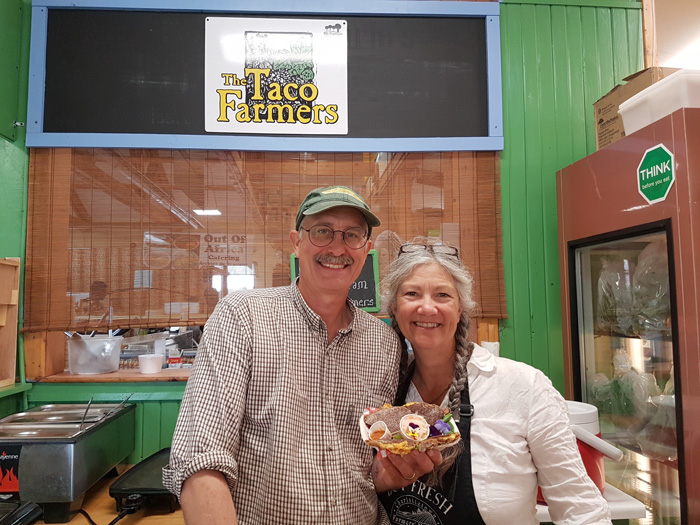Brian and Lorna McMaster, The Taco Farmers, want you to save your seeds
The Taco Farmers. The name is pretty spot on when you consider that Lorna and Brian McMaster grow nearly 100 per cent of the ingredients for the menu of their taco-centric booth at the Charlottetown Farmers’ Market. However, what you may not realize is that your tortilla and the ingredients in it represent a philosophy based on genetic diversity and the right to save seeds.
The McMasters grow their crops from open pollinated (OP) and heirloom seeds. They own and operate Pembroke Farms in Pembroke, PEI, and are passionate advocates of seed saving and seed sovereignty—a shared belief that seeds belong to people, not corporations, which includes the growers’ right to save, breed, and exchange seeds.
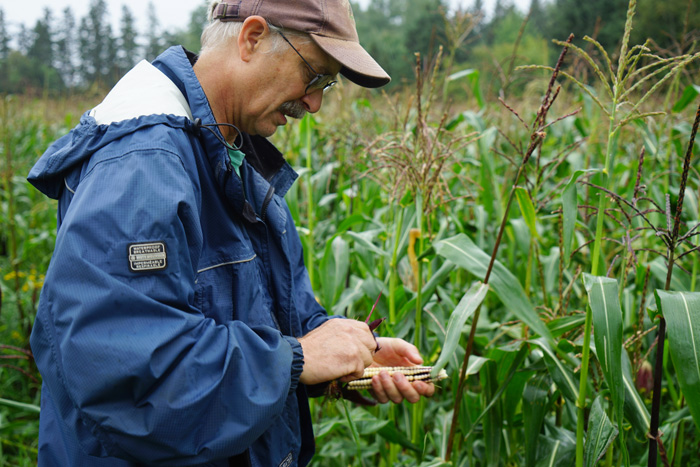
Brian McMaster examines the painted lady corn growing on the couple’s farm in Pembroke//Photo Credit: Evan Ceretti
Many farmers and large corporations use hybrid seeds in order to produce bigger, significantly higher-yielding, and better-looking crops. “There’s definitely a lot of advantages to growing hybrid vegetables,” said Lorna. “You’re basically taking the best of both parents and getting something brand new,” which might be exciting, but isn’t repeatable, she noted.
The use of hybrid seeds on a mass scale means OP seeds are being ignored and replaced, resulting in the loss of those seeds’ unique characteristics, genetic diversity, and variety. Ultimately, this means extinction for those plants and has resulted in a genocide of epic proportions. According to a 2011 report by the National Geographic, 93 per cent of fruit and vegetable varieties have gone extinct since 1903. “It’s mostly because big agriculture is taking over the seed companies,” said Lorna.
The McMasters moved from New Hampshire to PEI full-time in 2010. They started at the Charlottetown Farmers’ Market in 2012, and in 2015 rebranded themselves as The Taco Farmers and secured a full-time inside booth. This was a big game changer for them after four years of being at the market part-time in the outdoor space.

Almost 100 percent of the ingredients used in The Taco Farmers’ tacos are grown on their own farm//Photo Credit: Evan Ceretti
When they landed on the Island their intention was to raise sheep, as well as grow some produce. “We’ve been hybridizing our sheep for 20 years,” said Lorna, adding that it wasn’t such a big jump when they got into seed saving.
“When you take a seed from an open pollinated plant and put it back in the ground you’re going to get the same thing that the parents were,” said Lorna. And that’s how our ancestors did it. “In the old day, everybody saved their seeds. You’d find a favourite bean, or a favourite pumpkin or squash and of course you were going to save the seeds.”
There are setbacks to growing from OP seeds. For one, it’s expensive to breed plants. It’s also extremely time intensive. The McMasters consider themselves very lucky to have their tortilla business, which has afforded them the resources to better develop OP seeds and plants. “Our value-added products subsidize the time and effort it takes to produce seed as well,” said Brian.
Growing crops from OP seeds requires letting the plants go to seed in order to have seeds for future crops. Some crops, such as Swiss chard, which the McMasters grow, take up to two years to go to seed. “With hybrid seeds, you’re just going to grow the crop, cut it off, and eat it, and not worry about making more of them,” said Brian.
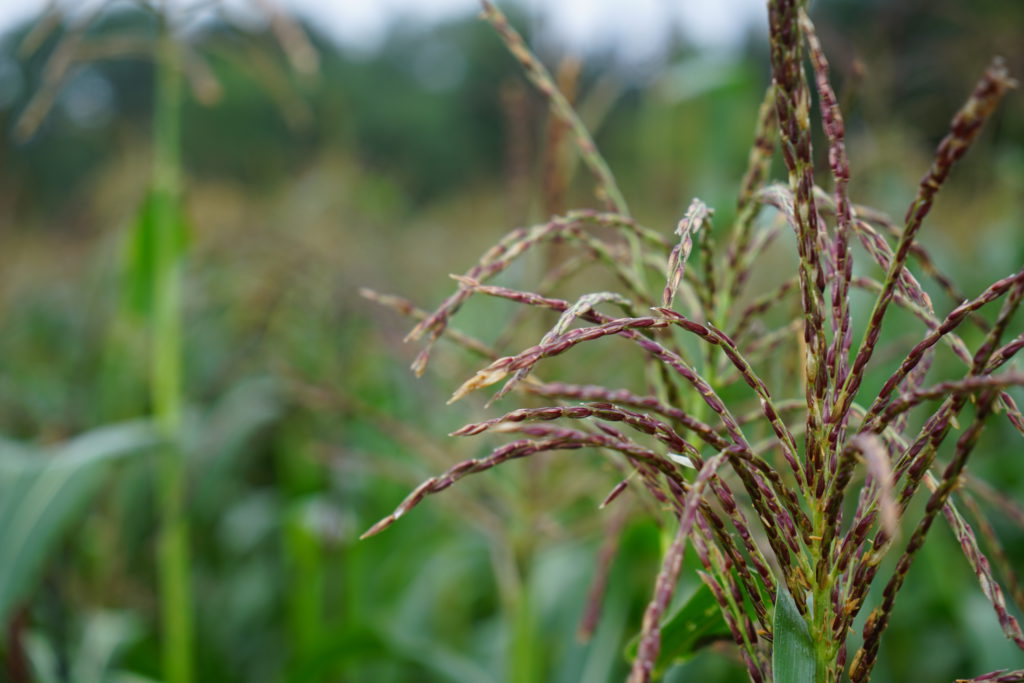
Photo Credit: Evan Ceretti
Brian and Lorna do field trialing with OP seeds to see which ones are the strongest and best for saving and producing on PEI. “We’ll take seven different cabbage varieties and try them all here to see which ones will grow well.” This is often a risky business, due to the possibility of the crops failing, and because it’s very time intensive. Market growers can’t necessarily afford to try all the different varieties to see which ones grow best, said Lorna. “But we can, because that’s we’re really all about.” If a variety doesn’t grow well here, it gets two strikes and it’s out, she said.
The McMasters have seen both successes and failures with their seed saving efforts. They were asked to grow out and work on a heritage broccoli from Nova Scotia. “Ultimately, we couldn’t raise enough seedlings out of that batch to make a viable breeding population. Help arrived too late,” said Brian. “It’s terrible seeing something go extinct before your very eyes.”
And that’s why seed saving and seed sovereignty are so crucial to the existence of fruit and vegetable species worldwide. Though there are very similar species to the variant of broccoli the McMasters tried to grow, that unique, local variety is gone forever, which only adds to the chilling extinction statistics noted earlier.
“A historic food, when you think about it, is a national treasure, it’s a living treasure. If you have seeds and they’re not grown out, they die; they don’t live forever,” said Lorna.
“I think if you trust corporations to grow all of your food, you have to remember what their motivations are,” said Brian. “They don’t care if squashes go extinct. If it’s not suitable for their market purposes, they don’t really care,” added Lorna. Seed sovereignty preserves more options and promotes genetic diversity.
As The Taco Farmers, the McMasters are able to provide customers with non—GMO, pesticide-free, locally-grown produce from OP seeds, which is one of their main goals, along with raising awareness. If their business continues to expand they wouldn’t be able to grow all their own ingredients and operate as they are now. They want to keep the full-circle integration, holistic aspect of the farm, said Brian.
The benefits of seed saving seem obvious to Lorna. Unless seeds become polluted or cross-pollinated, they can basically be replanted forever. Lorna is now sharing her knowledge with other seed-saving enthusiasts on PEI. She, along with a few other local women, started the PEI Seed Alliance. They decided they wanted to have a support network of professional growers, and to analyze what the best varieties of plants are for growing on PEI. They also provide workshops and classes for those interested in learning more about seed-saving.
The Taco Farmers’ main product is their sought-after corn tortillas. The corn they grow is called painted mountain corn, which was created by Dave Christensen in Montana almost 50 years ago, making it a soon-to-be heirloom variety. The corn flourished in Island soil and the bigger yields and better quality corn were the inspiration for the taco business. Lorna is gluten intolerant, which also contributed to their endeavours. Making tortillas is a heritage art, and Lorna isn’t trying to take that away from anyone, she said.
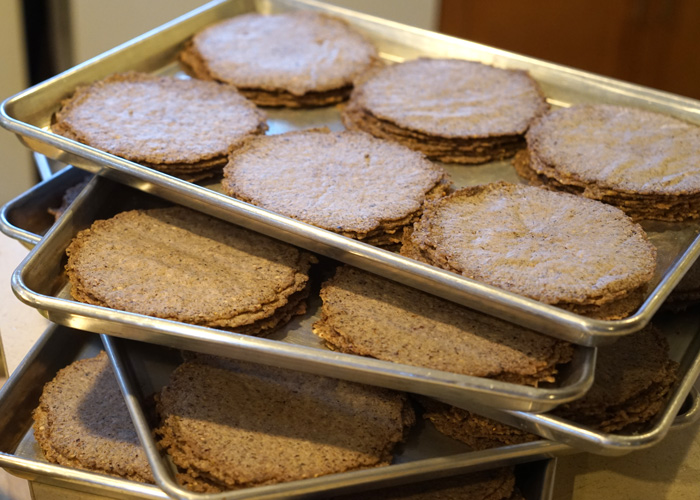
The Taco Farmers’ tortillas are made with corn grown on their farm and are gluten-free//Photo Credit: Evan Ceretti
Aside from selling their tortillas—around 400 (50 bags of 8) each week—they sell delicious cookies, mint herbal iced tea, wool products, canned sauces and pickles on occasion, and, of course, a variety of hearty meals including vegan bean tacos, Greek lamb tacos, quesadillas and enchiladas, all alongside succulent homemade salsas. Other than cheese, and sometimes cabbage, which go on the tacos, everything else is produced at Pembroke Farms.
“The most important word is resiliency,” said Brian. “The thing that we really are trying to do is to get people to understand that they can grow this. They can come to the market, they can eat the food, they can buy the seed, they can go home and do it themselves.”
He added that even though they’re filling people’s stomachs at the market, there are larger, overarching motivations. “We’re selling this as lunch. But it’s also political.”
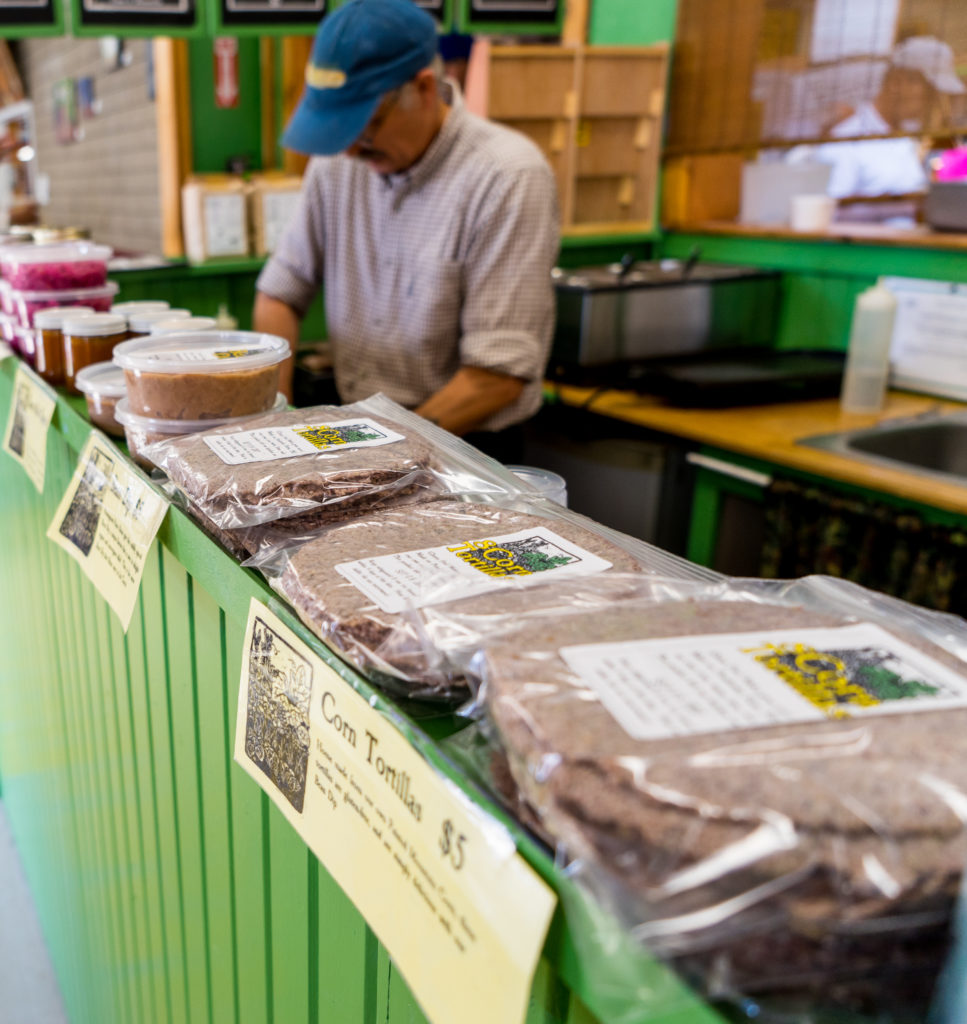
Photo Credit: Evan Ceretti
- GROWING VEGAN OPTIONS ON PEI - May 1, 2018
- WTF? - March 31, 2018
- THE POLITICS OF PRODUCE - March 1, 2018
- WTF? - March 1, 2018
- WTF? - February 1, 2018
- Some Like It Hot - January 1, 2018
- WTF? - January 1, 2018
- With a Grain of Salt… - December 1, 2017
- Seed for Thought - October 1, 2017
- From Field to Table - September 1, 2017

